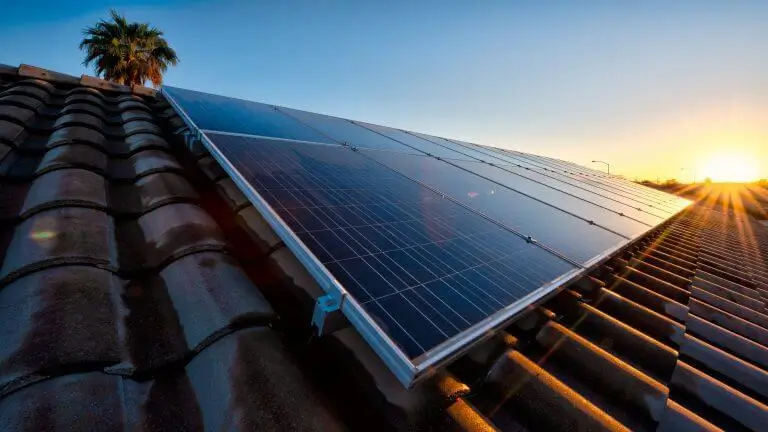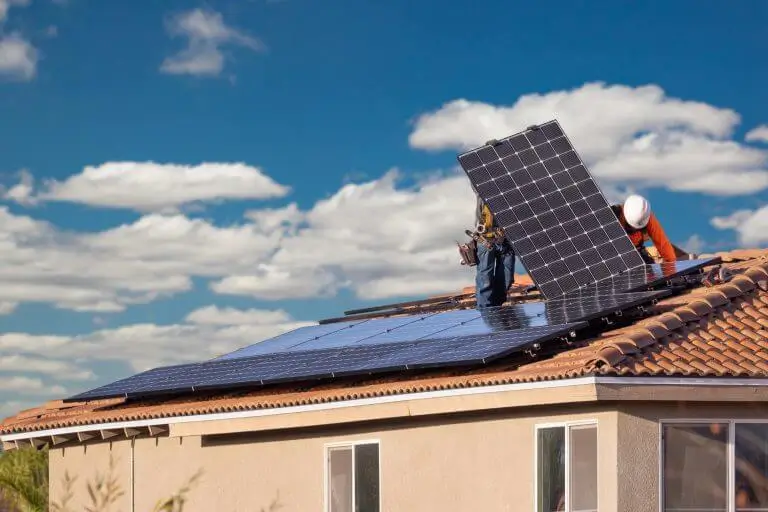Homeowners considering solar panels often wonder “can solar panels power a whole house”? Today, modern solar panel systems are indeed powerful enough to provide electric for an entire house. Using only solar energy, many homes are opting to convert to solar panels thanks to their many benefits.
In this brief overview, we’ll explore modern advancements in solar panels and their ability to effectively power an entire house. After reading, you’ll have everything you need to know to answer your burning questions about powering a house using only solar panels.
Although solar panels have been around for quite some time, they’ve recently gained even more popularity in the last decade. As technology advances and prices came down, more and more homeowners are beginning to see the many benefits in using solar panels to power their home. In addition, many local and federal government incentives (such as tax credits and rebates) have incentivized homeowners to switch to solar panels.

Homeowners wondering “can solar panels power a whole house”? often also question the cost effectiveness of solar panels. To determine the cost effectiveness of solar panels, you’ll first need to determine your home’s energy needs. You’ll need to know how much energy, on average, your home uses per month.
Using the average energy usage, SunTalk solar can help you to calculate how much power your solar panels will need to generate in order the power your entire house. While the average energy needs are considered, energy bills are likely to fluctuate throughout the year. You can checkout our solar estimator here.
The climate of your home is another important consideration when it comes to solar panels. Homes in colder and cloudier areas may not have enough sunlight in order to power a whole house. If you don’t see direct sunlight for weeks on end, this could pose a problem.
You’ll also want to take a look at the number of trees surrounding your property. Tall trees that produce large shady areas may block the sunlight’s ability to reach your solar panels.

The number of hours of direct sunlight your home receives each day is an important consideration. Making an estimate of the average number of daylight hours of direct sunlight your house gets can be useful in determining your needs for solar panels.
Fortunately our beautiful state, Colorado, is an excellent place for solar panels! Residents of the Centennial State enjoy several sunny days per year that are well above the national average.
Residential solar panels in Colorado can often overproduce the power needed for many homes during the long summer days. However, when days are shorter in winter, the panels may be blanketed with snow and produce less power. In this way, the electricity production can balance out annually producing an amount that enables you to run your whole house on solar energy alone! If you are curious about maintaining your solar panels and clearing off that snow, checkout this article.
According to the U.S. Energy Information Administration, “in 2019, the average annual electricity consumption for a U.S. residential utility customer was 10,649 kilowatt-hours (kWh), an average of about 877 kWh per month.”
For simplicity’s sake, let’s round that number up to 900 kWh per month. And let’s assume that this number applies to most residential properties in the United States. If we divide 900 by 30, we can determine that most homes consume 30 kWh per day or 1.25 kWh per hour.
That being said, it’s important to remember that this number does vary depending on the size of your home and the amount of household energy consumption. You may be able to find your home’s specific energy consumption rate listed on your monthly electricity bill. Be sure to check that out before making your own calculations.
If you want to learn more about how to connect solar to your house and how it works, checkout our more recent article explaining how solar connects to your house.
If you are curious about installing solar and are in the Denver, CO and Colorado Springs, CO area, please reach out. We’d love to help!
Powered by Healthy Digital | Privacy Policy
Proudly Serving, Denver, CO, Colorado Springs, CO and surrounding areas.